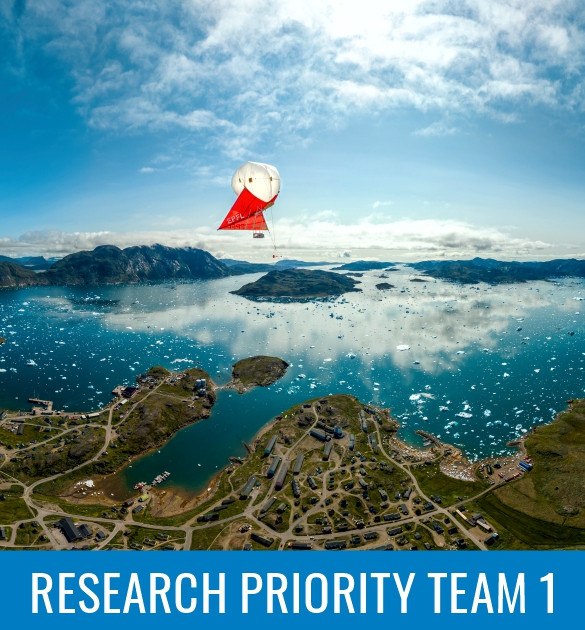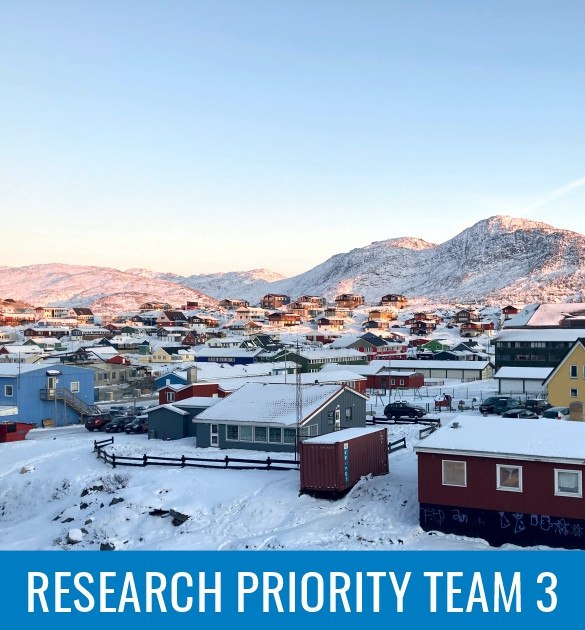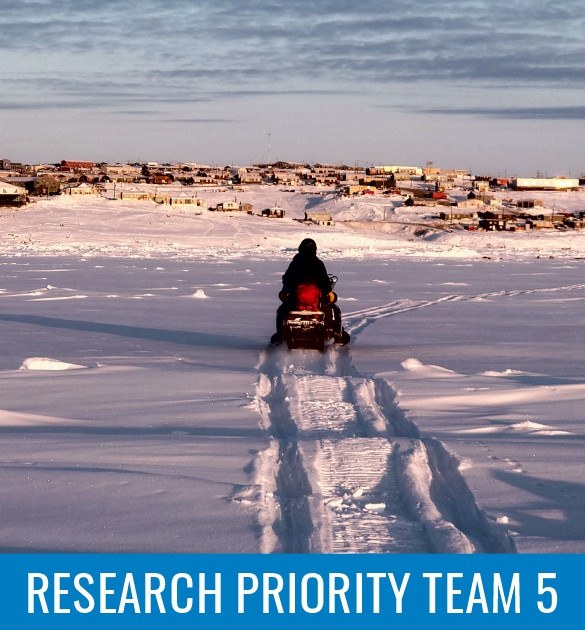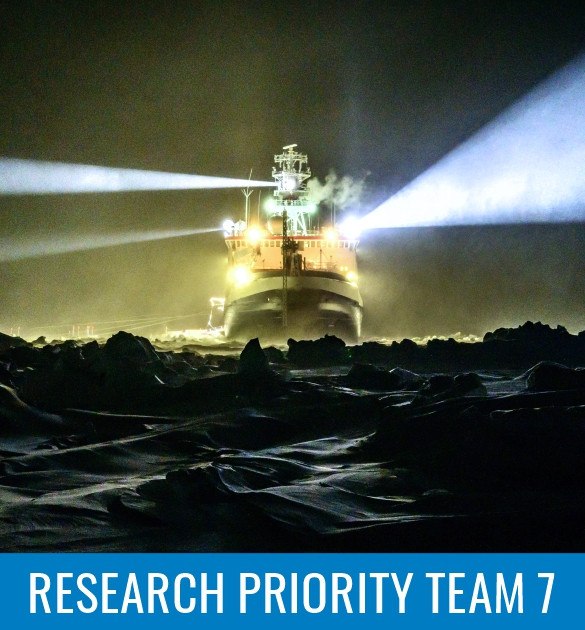Research Priority Teams
The team will address research priorities and their implementation regarding topics such as: the needs for further scientific understanding of the role of the Arctic in the global climate system (past, present, and future); extreme events; permafrost thaw and SLCF; temporal and spatial distribution of precipitation (spatio-temporal aggregation); teleconnection patterns; impacts of rapid changing Arctic on extreme events locally and remotely; and global consequences (including concerning human / social aspects).
Chairs:
This email address is being protected from spambots. You need JavaScript enabled to view it. (The University Centre in Svalbard, UNIS, Norway);This email address is being protected from spambots. You need JavaScript enabled to view it. (North Carolina State University, USA)This email address is being protected from spambots. You need JavaScript enabled to view it. (Stantec, Canada)
The team will address research priorities and their implementation regarding topics such as: Arctic observing needs (including prioritisation and planning tools for selecting observables and the engagement of indigenous peoples and stakeholders in these processes); climate system and transformations; predicting future climate dynamics; and the need for, and nature of, sustained observations and monitoring systems including spatio-temporal comparable monitoring of abiotic and biotic factors (e.g. atmosphere - vegetation - soil). In addition, the potential of paleobiology and paleoclimatology as a basis for conservation practices and evidence-based modelling will be assessed.
The team will address research priorities and their implementation regarding topics such as: sustainable and equitable Arctic economy; adaptive management and nature-based solutions (actions/adaptations/measures); healthy Arctic and healthy peoples (multi-stressor effects, contaminants and climate interactions, One Health); energy systems; sustainable energy production; green transition and green energy; reliability; resilience; food systems; sustainable production; resilience; water systems and drinking water; sanitary health; infrastructure and migration.
Chairs:
This email address is being protected from spambots. You need JavaScript enabled to view it. (ArcticNet and University of Ottawa, Canada)This email address is being protected from spambots. You need JavaScript enabled to view it. (Sauyaq Solutions, LLC, USA)
The team will address research priorities and their implementation regarding topics such as: effective international pan-Arctic cooperation in joint-funding and delivery of Arctic research outcomes; connecting and coordinating national and international funding agencies; utilising the role, contribution and value of Arctic science at times of high geopolitical tension; pathways to effective research cooperation; research exchange programs; and collaborative observing amid geopolitical constraints.
Chairs:
This email address is being protected from spambots. You need JavaScript enabled to view it. (UIT The Arctic University of Norway, Norway)This email address is being protected from spambots. You need JavaScript enabled to view it. (Belfer Center, Harvard Kennedy School, USA)This email address is being protected from spambots. You need JavaScript enabled to view it. (University of Akureyri, Iceland)
The team will address research priorities and their implementation regarding topics such as: co-production of knowledge; empowerment; capacity sharing; creating space and opportunities for Indigenous institutions / scholars to lead research and develop collaborations; Indigenous leadership; bringing education, science, and Indigenous knowledge together; producers and users of knowledge; and Indigenising Arctic research.
Chairs:
- Harmony Wayner (University of Alaska Fairbanks, USA)
This email address is being protected from spambots. You need JavaScript enabled to view it. (University of Alberta, Canada)This email address is being protected from spambots. You need JavaScript enabled to view it. (Arctic Athabaskan Council)
Subcategories
Research Priority Team 1: The Role of the Arctic in the Global System
The team will address research priorities and their implementation regarding topics such as: the needs for further scientific understanding of the role of the Arctic in the global climate system (past, present, and future); extreme events; permafrost thaw and SLCF; temporal and spatial distribution of precipitation (spatio-temporal aggregation); teleconnection patterns; impacts of rapid changing Arctic on extreme events locally and remotely; and global consequences (including concerning human / social aspects).
Access the reports and other materials published by RPT 1
Research Priority Team 2: Observing, Reconstructing, and Predicting Future Climate Dynamics and Ecosystem Responses
The team will address research priorities and their implementation regarding topics such as: Arctic observing needs (including prioritisation and planning tools for selecting observables and the engagement of indigenous peoples and stakeholders in these processes); climate system and transformations; predicting future climate dynamics; and the need for, and nature of, sustained observations and monitoring systems including spatio-temporal comparable monitoring of abiotic and biotic factors (e.g. atmosphere - vegetation - soil). In addition, the potential of paleobiology and paleoclimatology as a basis for conservation practices and evidence-based modelling will be assessed.
Access the reports and other materials published by RPT 2
Research Priority Team 3: Understanding the dynamics and resilience of Arctic social-ecological systems to foster sustainable futures
The team will address research priorities and their implementation regarding topics such as: sustainable and equitable Arctic economy; adaptive management and nature-based solutions (actions/adaptations/measures); healthy Arctic and healthy peoples (multi-stressor effects, contaminants and climate interactions, One Health); energy systems; sustainable energy production; green transition and green energy; reliability; resilience; food systems; sustainable production; resilience; water systems and drinking water; sanitary health; infrastructure and migration.
Access the reports and other materials published by RPT 3
Research Priority Team 4: Arctic Research Cooperation and Diplomacy
The team will address research priorities and their implementation regarding topics such as: effective international pan-Arctic cooperation in joint-funding and delivery of Arctic research outcomes; connecting and coordinating national and international funding agencies; utilising the role, contribution and value of Arctic science at times of high geopolitical tension; pathways to effective research cooperation; research exchange programs; and collaborative observing amid geopolitical constraints.
Access the reports and other materials published by RPT 4
Research Priority Team 5: Co-Production and Indigenous-led methodologies
The team will address research priorities and their implementation regarding topics such as: co-production of knowledge; empowerment; capacity sharing; creating space and opportunities for Indigenous institutions / scholars to lead research and develop collaborations; Indigenous leadership; bringing education, science, and Indigenous knowledge together; producers and users of knowledge; and Indigenising Arctic research.
Access the reports and other materials published by RPT 5
Research Priority Team 6: Education and knowledge-sharing in and about the Arctic: Research and Practice
The team will address how Arctic research planning and traditional knowledge are preparing present and future generations living in the Arctic and beyond to build community resilience and sustainability. Topics include: connecting Arctic issues, research priorities and their implementation; effective outreach, science communication and capacity building between research teams, local communities, decision-makers and the wider public; engaging young people, local communities, decision-makers and others in research planning; training a new generation of Arctic researchers, equipped to lead and be engaged in Arctic research at all levels; the role of EOC working at the interface of academic science and Indigenous traditional and local knowledge helping to combine and harmoniously integrate these different knowledge systems; measuring impact - effective planning and evaluation; equality, diversity, access and inclusion in EOC.
Access the reports and other materials published by RPT 6
Research Priority Team 7: Technology, Infrastructure, Logistics, and Services
The team will address research priorities and their implementation regarding topics such as: Arctic infrastructure needs; engineering; new and emerging technologies (e.g. AI and machine learning), the potential for further automation and remote operation in research; the requirements and opportunities presented by new large-scale research equipment and monitoring systems; the potential for step-changes in the sharing of national infrastructure and the creation of new international platforms.
Access the reports and other materials published by RPT 7








